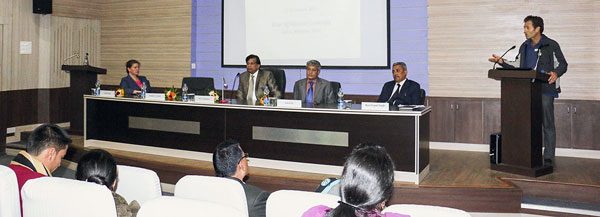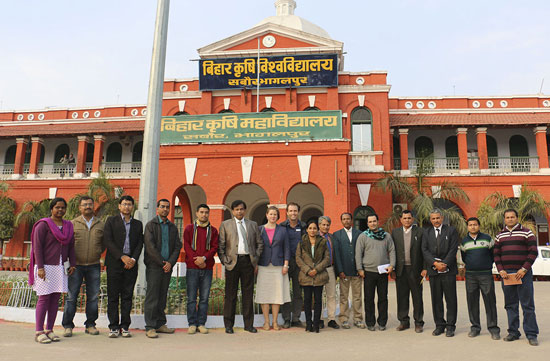In work to help farmers in South Asia tackle changing climates and markets through resilient and productive cropping systems, scientists are now using a leading and longstanding model, the Agricultural Production System Simulator (APSIM).
To foster better use of soil and water through conservation agriculture and other resource- conserving practices, the Sustainable and Resilient Farming System Intensification in the Eastern Gangetic Plains (SRFSI) project held an APSIM workshop for nine researchers from Bangladesh, India and Nepal at Bihar Agricultural University (BAU), Bihar, India during 27-29 January. The workshop was inaugurated by the Honourable Vice Chancellor, Dr. M.L. Choudhary, accompanied by Research Director Dr. Ravi Gopal Singh.

(CSIRO), Mr. Ashraf Ali (CIMMYT-Bangladesh), Dr. Ravi Gopal Singh (BAU) and Dr. Choudhary. Photos: Alison Laing (CSIRO) and Ashraf Ali (CIMMYT).
“The aim was to introduce these colleagues to the model and help them explore its adaptation and use,” said Md. Ashraf Ali, CIMMYT scientist and manager of SRFSI, which was launched in 2014 and is funded by the Australian Centre for International Agricultural Research (ACIAR).
“Our research targets rice-based systems in eight districts across those three countries, where wheat is often a key part of the rotation and climate change is already constraining crop yields.”
– Mahesh Kumar Gathala
CIMMYT cropping systems agronomist
According to SRFSI lead scientist, Mahesh Kumar Gathala, a CIMMYT cropping systems agronomist based in Bangladesh, SERFI works in Bangladesh, SERFI works in northwestern Bangladesh, West Bengal and Bihar in India, and the eastern Terai region of Nepal. “Our research targets rice-based systems in eight districts across those three countries, where wheat is often a key part of the rotation and climate change is already constraining crop yields.”
Ved Prakash (L) and Swaraj Dutta (R) work on modeling exercises.One response to climate change – conservation agriculture – involves a complex, knowledge-intensive suite of practices including reduced tillage, keeping crop residues on the soil surface and careful use of rotations. A model like APSIM can speed the design and adoption of approaches tailored to specific locations, Singh explained. “But to provide reliable results, the model has to be adapted for the soil, climate and other conditions of each area,” he said.
Led by Don Gaydon and Alison Laing from Australia’s Commonwealth Scientific and Industrial Research Organisation (CSIRO) and with practical assistance from Dr. Sanjay Kumar, BAU, and Ali, the course provided theory and practice on the APSIM user interface and how to manage data on soils, weather and soil dynamics such as residue decomposition and moisture levels. “We also looked at how to model direct-seeded rice and wheat crops, long-term crop rotations and cropping simulations under climate-change,” Ali said.
Once assembled, a project modelling team with members from Bangladesh, India, Nepal and CSIRO will identify relevant parameters, calibrate the model and test it for diverse locations. Ultimately they will analyze scenarios for diverse crop management options, both current and proposed.
“With APSIM we can virtually ‘extend’ SRFSI field trials into the future by twenty years or more, gaining insight on long-term system variability,” Gathala said. “We can also explore likely impacts of the region-wide outscaling of new management options from one farm or village, including effects of different options on sustainability or greenhouse gas emissions, which can be difficult or expensive to measure in the field.”

 Capacity development
Capacity development 
